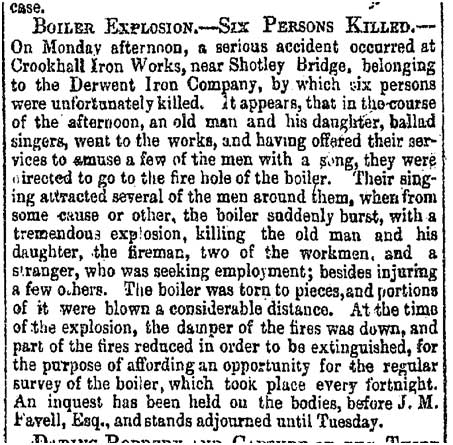
Glimpses of Local Ballad Singers
I am engaged in a long-term research project on the history of street ballad singers. For over three centuries ballad singers, selling cheap song sheets (known as broadside ballads, slip songs or 'ballets') were a common sight on streets, and at markets and fairs all over Britain. Over the years thousands of people undertook this occupation. We sometimes get glimpses into the lives of these people, most commonly when they got into trouble of one kind or another. Here are some examples of the sort of material that can be found.
The first is a character sketch from a nineteenth century local history book. William Cleghorn, more generally known as "Billy Conolly" died August 9th 1860 at Alnwick, aged 83.
He was the last of the old eccentricities of the town. He served his time to be a leather breeches maker, but for many years he led a wandering life, selling the ballads and stories of Cattanach [sic, properly Catnach] of the Seven Dials, London, who was also a native of Alnwick. He is said to have been the veritable "King of the Beggars" in St. Giles's; and at one time he was kidnapped and carried to France, and exhibited as a dwarf, being very diminutive in stature. He was liberated on complaining of his treatment to some of the authorities of a town who had come to see the English dwarf. In his latter days he earned a livelihood by selling nuts and oranges, and was well patronised by the public. [Fordyce, Local Records, Newcastle 1867, 378-9].
Obviously, Billy had had an eventful and far-travelled life. More tragic was the fate Thomas Whitfield. Ballad singers, if they were successful, could make a reasonable living but it was also the resort of those destitute, seeking a legitimate or legal way to beg. Often itinerant, many died on the road. Such was the case with Thomas Whitfield in 1881. At Bishop Auckland Workhouse, an inquest was conducted:
...on the body of a ballad singer, named Thomas Whitfield, seventy-six of Durham, who was found dead in Peel Street on the previous Sunday Morning. The deceased had walked from Ferryhill and had been seen singing in the street in apparently an exhausted condition...verdict of "Died from Exposure to cold". [PASSING NOTES The Illustrated Police News etc (London, England), Saturday, December 24, 1881; Issue 932, 4.]
The final example is even more dramatic. It dates from 1847 and is an account of two ballad singers, a father and a daughter, who inadvertently got involved in a terrible accident near Shotley Bridge. The account is interesting in that it shows a way in which ballad singers would simply turn up at a place and get an audience, I am sure that this could not happen today, and points to the unusual quality of the experience of hearing music before the age of electronic reproduction.
[Newcastle Courant, 23rd April 1847]
It is from such accounts that we get some insight into the lives of street ballad singers. By finding a lot of such information we are able to build up a view of these interesting but obscure people. It is significant that ballad singers, marginal figures yet in some ways ancestors of all of us who perform traditional songs today, only really come into historical visibility when they are in trouble, die or are killed.
Vic Gammon - Academic profile - http://www.ncl.ac.uk/sacs/staff/profile/vic.gammon
Some publications on-line
http://eprint.ncl.ac.uk/
Watch out for Bramble Briars and Beams of the Sun: Traditional English ballads sung by A L Lloyd (FECD240) with full length introduction and commentary by Vic Gammon, issued by Fellside Records this summer.
Don't miss 'A Celebration of Traditional Music: Vic Gammon's Gold Badge Concert' Sunday 30th October 2011, from 4.45, St Mary's Visitor's Centre, Gateshead. Tickets available from The Sage Gateshead from the summer.
Book early or be disappointed, as numbers are limited.
